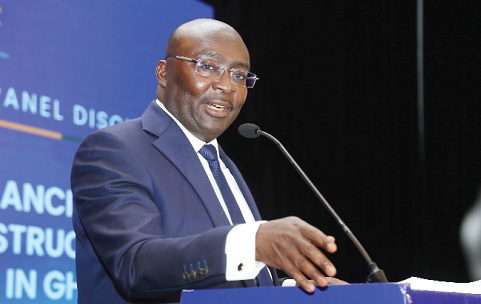The Vice-President, Dr Mahamudu Bawumia, has proposed a broad-based road-tolling system to ensure equity.
He said there was inequity in the architecture of the road-tolling system of the country as it tended to exclude the wealthier part of the population.
“The current architecture that we have in tolling really tends to exclude even the wealthier part of the population, so if I live in Cantonments, East Legon, Ridge, which are the high-end neighbourhoods, I will not see a toll but if I live at Kasoa or somewhere else, I am likely to meet a toll.”
“There seems to be an inequity in tolling and I believe that we should look at broad-based tolls,” he stated. Dr Bawumia said this when he addressed the opening of a panel discussion on road financing in Accra yesterday.
He urged the stakeholders to find ways of widening the scope of tolling, saying, “Then we all contribute and the revenue could be much higher.”
50th Anniversary
The event, which was attended by Members of Parliament (MPs), engineers, consultants, representatives of financial institutions and contractors was organised by the Ghana Highway Authority (GHA) as part of its 50th anniversary.
![]()
Stakeholders in the forum
It was on the theme: “Closing the financing gap in road infrastructure development in Ghana”. Dr Bawumia said exploring innovative financing models was essential to generating sustainable revenue streams.
In that regard, he said, infrastructure bonds, road funds and toll systems could provide dedicated funding for road development and maintenance.
Those mechanisms, Vice-President Bawumia said, reduced reliance on traditional budgetary allocations and allowed for more predictable and stable funding.
“We have seen successes with initiatives such as the road fund, financed through fuel levies, which has significantly contributed to road maintenance efforts.”
“Our government is committed to expanding such initiatives and exploring new models to enhance our funding capacity,” Dr Bawumia said. To realise those goals, he said: “We must confront the significant financing gap that threatens to undermine our progress.”
Maintenance backlog
While stating some statistics to buttress the point, Dr Bawumia said the nation, according to recent estimates, required $12 billion to clear the maintenance backlog and enable the network of about 94,203km of roads to be at an optimal level.
He said current funding levels only covered about 38 per cent of the requirement, which left a significant shortfall. The Vice-President said the gap translated into deteriorating road conditions, increased maintenance costs and missed economic opportunities.
Public-private partnerships
Dr Bawumia, therefore, called for a Public-Private Partnerships (PPP) approach as a viable solution to bridge the financing gap. By fostering collaboration between the public sector and private investors, he said: “We can unlock new funding streams and leverage expertise in project implementation.”
“To foster successful partnerships, it is essential to build strong relationships with construction firms, engineering companies and technology innovators who can provide both financial support and valuable expertise,” Dr Bawumia added.
Road construction
The Minister of Roads and Highways, Francis Asenso-Boakye, said the ministry through its implementing agencies managed a road network size of 94,203 km, out of which 28 per cent was paved and the remaining 72 per cent unpaved.
As of the end of 2023, he said, 44 per cent of the road network in the country was in good condition, 34 per cent in fair condition and 22 per cent in poor condition as against an original target of 70 per cent good, 20 per cent fair, and not more than 10 per cent in poor condition by the end of 2025.
Mr Asenso-Boakye said with trade, transit, urbanisation, development and other economic factors, there was a growing demand for more and better roads across the length and breadth of our country.
He said between 2017 and the end of 2023, the government had added 12,830km of roads to the national network.

